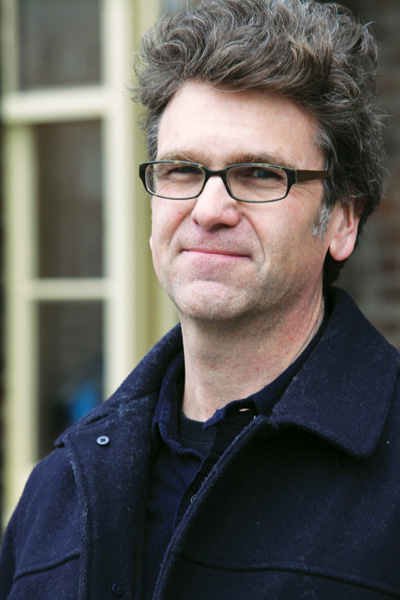Guggenheim Fellowship Spotlights Two Faculty Members

Professor of Art Harry Roseman and Visiting Associate Professor of English David Means are the recipients of prestigious John Simon Guggenheim Memorial Foundation Fellowships for 2013. The coveted Guggenheim Fellowships, granted to acknowledge past achievement and exceptional promise, were awarded to 175 scholars, artists, and scientists from a pool of almost 3,000 applicants.
“A Guggenheim Fellowship is one of the highest awards given to faculty and independent scholars and creative artists each year, and for Vassar faculty to have received two this year is remarkable,” says Acting President Jonathan Chenette.
Roseman and Means both received awards in the creative arts category.
“We are extraordinarily proud of these two wonderful faculty members and, by extension, the superb faculty of which they are a part,” says Chenette.
Roseman, who has taught at Vassar for 32 years, recalled the moment he received the news: “My very first thought was, strangely, that now I don’t have to be depressed that I didn’t get it. The feeling was a combination of elation and relief. Needless to say, I am very pleased.”
Well known among students and alumnae/i as a gifted teacher and mentor, Roseman is also a noted fine artist. His work ranges from photographs and drawings to commissioned public sculptures. The Metropolitan Transportation Authority (MTA) Arts for Transit program commissioned his 40-foot bronze relief Subway Wall in 1990. This landscape piece is located under the 60 Wall Street building in Manhattan. Four years later, the Rockland Arts Council commissioned him to create Four Houses—brick and mortar houses, each measuring only four-by-five feet—for Rockland Community College. His largest public work, Curtain Wall, a 600-linear-foot relief sculpture installed in Terminal 4 at the John F. Kennedy International Airport in 2001, received the New York City Municipal Art Society’s Masterwork Award for New Public Art.
His work, North Entrance, was installed last year in the accessible entrance of Vassar’s Thompson Memorial Library. Other recent work has included plywood sculptures and large drawings of plywood on linen through which he explores the nature of the material world.
In the fall, Roseman is taking a sabbatical from teaching to work in his studio. “I can’t think of a more valuable thing to buy with money—time,” he says.

David Means has been a member of the English Department since 2001. His extensive bibliography includes four award-winning short story collections: A Quick Kiss of Redemption (1991), Assorted Fire Events (2000), The Secret Goldfish (2004), and The Spot (2010). Means’s work has appeared in many publications: notably the Paris Review, the New Yorker, Harper’s Magazine, and Esquire, as well as in collections: Best American Short Stories, The O. Henry Prize Stories, and Best American Mystery Stories. Two of his stories have been produced for spoken-word performances by National Public Radio’s Selected Shorts.
According to a 2010 review of The Spot in the Paris Review, “David Means has established himself among the finest and most incisive American writers of contemporary short fiction. … Means has delivered exquisite local portraits of the destitute, desolate and disconsolate in postindustrial America.” The Spot was a 2010 New York Times Notable Book.
Means also loves teaching. “There are these wonderful transcendent moments in teaching when the students are giving back and you’re giving, and then for a few minutes, you’re out of yourself and out of the noise of the external world and together you’re into a subject, tweezing it apart, gaining a completely new understanding that can only arrive from that particular group, that particular class—and then you’re mutually learning together. The students at Vassar are wonderful—and that might sound like pandering, but it’s absolutely true that they’re the most enjoyable part of teaching.”
The fellowship will afford Means time to focus on a longer piece of fiction about Vietnam, Michigan, and post-traumatic stress disorder, as well as stories about a family living along the Hudson River in a small town.
